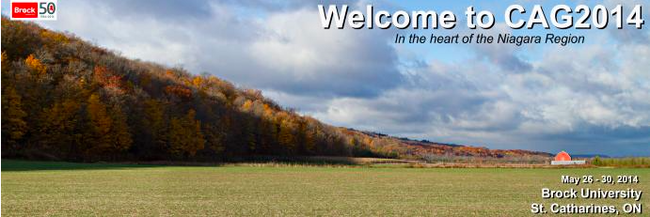The Department of Geography at Brock University is hosting the 2014 annual conference and meeting of the Canadian Association of Geographers (CAG), May 26-30, 2014. This event is part of the largest academic gathering in Canada - the Congress of the Humanities and Social Sciences - and it includes a range of activities and events; some of which have been organized in collaboration with two partner associations, the Canadian Cartographic Association (CCA) and the Environmental Studies Association of Canada (ESAC).
The Special Sessions Sponsored by the Tourism and Recreation Study Group will be at the CAG Annual Meeting at Brock University in St. Catherines, ON from May 26-30th, 2014.
Please send abstracts directly to the session organizers by March 10th, we look forward to seeing you ).
Sessions:
1) Qualitative methodologies and reflexive knowledge production in tourism geography
2) Endogenous development paths in rural regions
3) Assessing the impact of emerging tourism initiatives
Session 1)
Session Organizer:
Susan Dupej: sldupej@yorku.ca
Session Title:
Qualitative Methodologies and Reflexive Knowledge Production in Tourism Geography
This session highlights work in tourism geography that that sees knowledge as subjective: constructed on the subjectivities of partial perspectives belonging to both researchers and participants (Haraway 1991). We seek papers that break from the business-driven, positivist tourism research agendas and challenge ‘grand narratives’ (Hatch 2002) with claims of situated knowledges, plural positions and multiple truths. Of interest are papers that focus on interpretive qualitative research methods that do not necessarily report facts but “meaningful constructions that individual actors or groups of actors form to ‘make sense’ of the situations in which they find themselves” (Guba and Lincoln 1988 8). Approaches include, but are not limited to:
o Participant observation
o Memory work
o Biographical diaries
o Focus groups
o Visual exercises
o Photography
o Informal/conversational interviews
This session also considers how these methods produce reflexive knowledge and raise questions about the power relations and politics of research underpinning the production of academic knowledge in tourism geography.
Session 2)
Session Organizers:
Patrick Brouder & Chris Fullerton
Email Address:
Session Title:
ENDOGENOUS DEVELOPMENT PATHS IN RURAL REGIONS
Study Group Sponsorship:
Tourism and Recreation Study Group
Brief Description of Session (please specify if your session will be a panel, workshop, themed talk, or something else):
Rural and peripheral communities have been, and are still being, established as outposts of capitalism and prosper through primary industries such as agriculture, mining, forestry, and fishing. Many communities, however, are facing long term negative socioeconomic trends due to a combination of endogenous changes (e.g., ageing population) and exogenous pressures (e.g., economic restructuring). Thus, many communities are forced to look beyond their traditional staple industries for new sources of development.
Human Geographers have begun to reconceptualise rural development so that it is no longer about sectoral development per se but about “place-based” community development through various economic sectors. By identifying local assets and harnessing these to pursue community development goals a whole new set of possibilities for endogenous development is created.
This session invites papers addressing endogenous development paths in rural and peripheral regions. Submissions may address, but are not limited to, the following topics:
• community economic development
• place-based development, asset-based community development
• rural tourism (including heritage and nature-based tourism)
• quality-of-life, quality-of-place, and community well-being
• marginalised groups in rural and peripheral development
• local partnerships and networking
• social capital as a community development resource
Session 3)
Session Organizer: Kim Lemky klemky@unb.ca
Session Title:
Assessing the impact of emerging tourism initiatives
Study Group:
Tourism and Recreation Study Group
There have been many changes to the traditional tourism landscape across Canada, from a decrease in the number of American tourists who travel into Canada, to a decrease in the number of cruise passengers visiting in Atlantic Canada. However, there have also been changes to some of our key attractions, e.g., reduction of hours and personnel at our Canadian National Parks and changes to the acceptable levels of tourism infrastructure in the national parks. The first Global Geopark in North America has been designated in a 2500 sq km area in Southern New Brunswick. Geographers have an important role to play in helping to guide policy and conducting cost benefit analysis of the impacts of these changes in tourism. This session will be used to capture the emerging trends in tourism geography.
This session can examine any number of the new developments in tourism and can include:
New rules and regulations (e.g., changes in acceptable development Canadian National Parks)
Cruiseship Tourism
New international designations such as Stonehammer Geopark
Analytical methods that are used to assess economic impacts to tourism
Growth in Wine Tourism
Souvenir purchasing etc.
We look forward to seeing you at the 2014 CAG Annual Meeting at Brock University.
For more information visit: https://sites.google.com/site/tourismrec/ and http://www.brocku.ca/social-sciences/departments-and-centres/geography/cag2014

